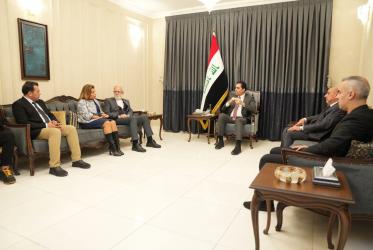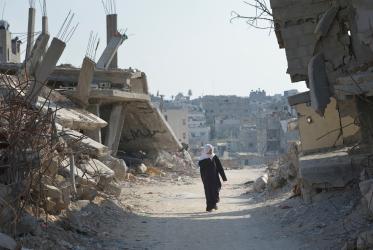Seek peace and pursue it. (I Peter 3:10)
Blessed are the peacemakers as they shall be called children of God. (Matthew 5: 9)
A fundamental Christian belief is that God has made us and all creation and requires us to seek peace with justice. The church must work for a world where none need live in fear and every life is sacred. Through God's grace, we witness to our faith with love and hope for all humankind. As the WCC executive committee noted at the peak of the Cold War:
"The churches must speak out against the tendency to resume perilous tactics of brinkmanship. Claims by any nation to become strongest at any cost should be deplored. Churches should make clear in no uncertain terms that perspectives of foreign policies can no longer be seen in terms of 'liquidating the enemy' (be it politically, militarily or through economic and cultural pressure). Peace requires willingness on the part of deferring political and social systems to co-exist and co-operate with each other". WCC executive committee, "Threats to Peace", February 1980
These are prophetic words of wisdom that I recall as I reflect on the fourth anniversary of the war in Iraq. These have been difficult years of pain, rancour, disappointment and loss. During the military intervention in Iraq, appeals for restraint by large sections of the church and civil society as well as the international community were ignored with contempt and disdain. Political brinkmanship and the arrogance of power triumphed over reason and good sense. As a result, Iraq today is in turmoil and disarray, and there are strong indications that the country may fragment, creating greater chaos and human suffering.
In the war in Iraq, the international community saw gross and persistent violations of some of the finest principles it had so painstakingly developed during the last fifty years. These relate to respect for international rule of law, protection of human rights and upholding of peace with justice. It is no secret that prisoners detained in Iraq by the coalition forces are inhumanely treated, and it is estimated that about one-fourth of them are innocent. The ill-treatment of these prisoners, in many situations, has angered the civilian population and has turned them against the coalition forces.
The US military strategy to stabilize Iraq is not succeeding despite the deployment of extra troops. Bombing attacks by insurgents continue with dreadful regularity. With ethnic and sectarian tensions and conflict on the rise, the country stands on the brink of a civil war. According to the 2006 study by the John Hopkins Bloomberg School of Public Health, since the US invasion, it is estimated that over 600,000 Iraqis have lost their lives as a direct or indirect result of violence by coalition forces or insurgents. This war was promoted to save lives. Instead it gives the impression that there is a conspiracy between the two sides to outdo each other in terms of their military actions, at the expense of the Iraqi people. Another report released in 2006 by the office of the United Nations High Commissioner for Refugees places the total number of refugees displaced by the war at more than 1.6 million.
The polarization of Iraqi society, coupled with the weakness of the state and the security forces in general and the trend to take recourse to violence by all sides to resolve differences and disputes is driving the country towards an increase in communal and insurgent violence and political extremism. Unless the major communities - Sunnis, Shias and the Kurds - come together in the larger interest of their people and work out a federal system of governance that meets the aspirations of the three communities, Iraq is likely to end up in chaos, confusion and blood-letting even worse than what we witness at present. To avoid an anarchic fragmentation of the state, adjustments, concessions and, most of all, understanding and patience must be shown by all sides in order to arrive at an equitable and just formula of power-sharing.
The WCC executive committee that met in February 2003, just before the outbreak of hostilities, was aware of the pitfalls of the military intervention and called the war immoral, ill-advised and in breach of the principles of the United Nations Charter. It therefore warned:
" that war in Iraq will cause humanitarian crisis of great magnitude with untold human suffering, specially for the children of Iraq, loss of life, property, environmental destruction and waste of precious resources; it will reinforce and polarize division and hatred between communities resulting in further destabilization in the region".
Four years down the road, the above has come true and yet the sponsors of this tragic war insist on carrying on military pursuits that, no doubt, will result in further carnage and destruction. Iraq is a broken and fractured society that badly needs healing and reconciliation. We hear the cries of the Iraqi people, the women, the children and the innocent civilians who are in pain and agony and despair. It is our Christian responsibility to respond to their cries.
The ecumenical political ethic calls for power to be exercised with utmost respect for human dignity and for the sanctity of life. The situation of Iraq demands that the churches continue not only to assist and support the victims of this disastrous war, but also to speak on their behalf and to redouble intervention for peace with governments and with intergovernmental bodies.
We are encouraged by the upsurge of anti-war sentiments all over the world, particularly in the United States. The churches in the United States, in the midst of suffering and death in Iraq, are called to witness to Jesus Christ, the life of the world. God's gift of life is sacred. It is entrusted to us for care and nurture. This precious gift merits enduring respect for the international rule of law and the upholding of human dignity.
At this time, I call on WCC member churches to pray and intercede on behalf of the people of Iraq, before God, that the war forced upon them may come to an end and that peace with justice and dignity may prevail for all the people of Iraq.




